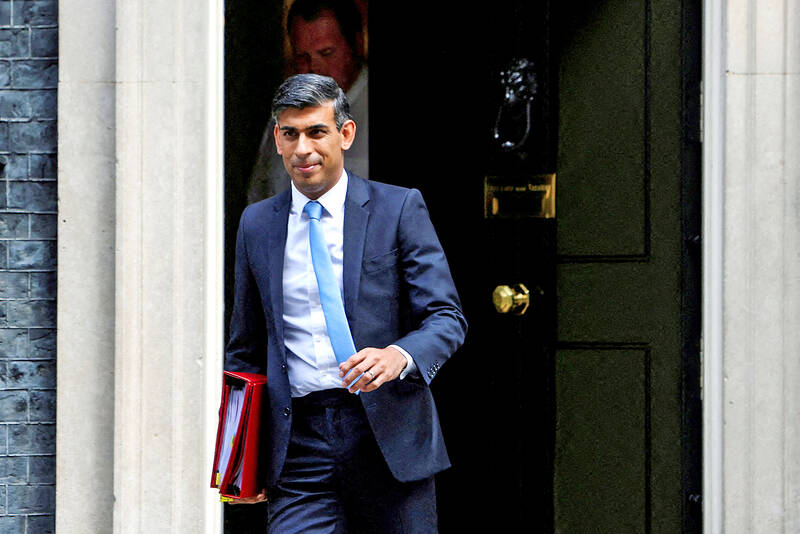The British government yesterday resisted calls to label China a threat to the UK following a revelation that a researcher in parliament was arrested earlier this year on suspicion of spying for Beijing. China branded the allegation of espionage a “malicious smear.”
British Secretary of State for Business and Trade Kemi Badenoch said that Britain should avoid calling China a “foe” or using language that could “escalate” tensions.
“China is a country that we do a lot of business with,” Badenoch told Sky News. “China is a country that is significant in terms of world economics. It sits on the UN Security Council. We certainly should not be describing China as a foe, but we can describe it as a challenge.”

Photo: Reuters
British Prime Minister Rishi Sunak’s spokesman, Max Blain, said that it was wrong to reduce the UK’s approach to China “just to one word.”
“We need to take the opportunity to engage with China, not to just shout from the sidelines,” Blain said.
Tensions between Britain and China have risen in the past few years over accusations of economic subterfuge, human rights abuses and Beijing’s crackdown on civil liberties in the former British colony of Hong Kong.
Under Britain’s new National Security Act, if China were officially labeled a threat, anyone working “at the direction” of Beijing or for a state-linked firm would have to register and disclose their activities or risk jail.
Conservative hawks renewed their calls for a tougher stance after the Metropolitan Police force confirmed over the weekend that a man in his 20s and a man in his 30s were arrested in March under the Official Secrets Act. Neither has been charged, and both were released on bail until next month pending further inquiries.
The Sunday Times reported that the younger man was a parliamentary researcher who worked with senior Conservative lawmakers and held a pass that allowed full access to the Parliament buildings.
The researcher, whom police have not publicly named, maintained in a statement released by his lawyers yesterday that he is “completely innocent.”
“I have spent my career to date trying to educate others about the challenge and threats presented by the Chinese Communist Party,” the researcher said in the statement. “To do what has been claimed against me in extravagant news reporting would be against everything I stand for.”
Chinese Ministry of Foreign Affairs spokesperson Mao Ning (毛寧) said “the so-called Chinese espionage activity in the UK is non-existent. We urge the British side to stop spreading false information and stop its anti-China political manipulation and malicious smear.”
Sunak said he chided Chinese Premier Li Qiang (李強) over the alleged espionage when the two met on Sunday at a G20 summit in India.
Sunak told British broadcasters in New Delhi that he had expressed “my very strong concerns about any interference in our parliamentary democracy, which is obviously unacceptable.”

The CIA has a message for Chinese government officials worried about their place in Chinese President Xi Jinping’s (習近平) government: Come work with us. The agency released two Mandarin-language videos on social media on Thursday inviting disgruntled officials to contact the CIA. The recruitment videos posted on YouTube and X racked up more than 5 million views combined in their first day. The outreach comes as CIA Director John Ratcliffe has vowed to boost the agency’s use of intelligence from human sources and its focus on China, which has recently targeted US officials with its own espionage operations. The videos are “aimed at

STEADFAST FRIEND: The bills encourage increased Taiwan-US engagement and address China’s distortion of UN Resolution 2758 to isolate Taiwan internationally The Presidential Office yesterday thanked the US House of Representatives for unanimously passing two Taiwan-related bills highlighting its solid support for Taiwan’s democracy and global participation, and for deepening bilateral relations. One of the bills, the Taiwan Assurance Implementation Act, requires the US Department of State to periodically review its guidelines for engagement with Taiwan, and report to the US Congress on the guidelines and plans to lift self-imposed limitations on US-Taiwan engagement. The other bill is the Taiwan International Solidarity Act, which clarifies that UN Resolution 2758 does not address the issue of the representation of Taiwan or its people in

US Indo-Pacific Commander Admiral Samuel Paparo on Friday expressed concern over the rate at which China is diversifying its military exercises, the Financial Times (FT) reported on Saturday. “The rates of change on the depth and breadth of their exercises is the one non-linear effect that I’ve seen in the last year that wakes me up at night or keeps me up at night,” Paparo was quoted by FT as saying while attending the annual Sedona Forum at the McCain Institute in Arizona. Paparo also expressed concern over the speed with which China was expanding its military. While the US

SHIFT: Taiwan’s better-than-expected first-quarter GDP and signs of weakness in the US have driven global capital back to emerging markets, the central bank head said The central bank yesterday blamed market speculation for the steep rise in the local currency, and urged exporters and financial institutions to stay calm and stop panic sell-offs to avoid hurting their own profitability. The nation’s top monetary policymaker said that it would step in, if necessary, to maintain order and stability in the foreign exchange market. The remarks came as the NT dollar yesterday closed up NT$0.919 to NT$30.145 against the US dollar in Taipei trading, after rising as high as NT$29.59 in intraday trading. The local currency has surged 5.85 percent against the greenback over the past two sessions, central